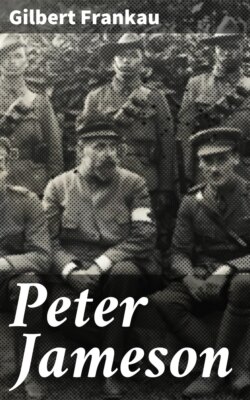Читать книгу Peter Jameson - Gilbert Frankau - Страница 38
На сайте Литреса книга снята с продажи.
§ 4
ОглавлениеTable of Contents
But in addition to this growing revulsion against the enemy—(dislike of the Germans had been ingrained in the man’s character since his first day in business)—the thousand emotional flea-bites of the period began to affect Peter. That he could be hearing whispers of the English-speaking spirit—the spirit that was even then driving Francis Gordon, nervous to the depths of his imaginative soul, into dangers beyond belief, dangers that had to be faced in cold blood and absolutely alone—never struck the Chairman of Nirvana Limited.
He was conscious only of a Questioning; it seemed as though every one and everything asked him something, something he could not answer.
The morning newspaper began that Questioning. It lurked, somehow or other, behind the war-news, the casualty-lists. More than one name which conjured up the face of a boy known at Eton, figured in those early columns. Challis minor, in his own house, who had held onto his position till the last moment: “dying,” wrote his Colonel to his mother, “as I am sure you would have wished him to die.” Latham of the Artillery, who had fought his gun single-handed till he dropped dead over the breech-block. Peter caught himself trying to explain to a shadowy Challis minor how impossible it was for certain people, people with responsibilities like his own, to join the Army. …
Evelyn and Primula too, now back at Lowndes Square, accentuated uncertainty. They could talk of nothing but the soldiers they had seen drilling in Kensington Gardens, the motor that had dashed—astounding phenomenon—down the Broad Walk. They reminded him of the episode, trivial at the time but constantly recurring, of Patricia’s brother, Jack Baynet. Jack had been mobilized with the 6th Division; had asked Peter and Patricia to visit him in Camp at Cambridge. Peter had promised to go, cried off at the last moment. One couldn’t very well mingle, an able-bodied civilian in mufti, with men who were going to France within the week. …
An eternal Questioning! Everything, everybody, seemed an embodied and personal demand. Everything, everybody—the khaki, blossoming now like a brown flower at every street-corner; the boy Parkins who had to be assured that his place would be kept before he enlisted; a traveller and two mechanics at the factory who went first and asked afterwards; Miss Macpherson’s eyes when she dictated the Havana mail; Pat. For Patricia grew very silent those days. …
By the first week in September Peter had solved the Questioning; reduced it to a question. And the question, briefly, was this: “To join up meant the almost certain sacrifice of Nirvana. Not to join up, meant the definite loss of self-respect. Which should he do?” He had no fear of the soldiering part: on the contrary—being entirely and blessedly ignorant of warfare’s actualities—it seemed to him the obvious, glorious and easy solution of his problem. To abandon his business-responsibilities, on the other hand, implied—quite apart from the pang of giving up the thing he most loved—a lack of moral courage, a yielding to popular clamour.
Curiously enough, it was not Patricia but Hubert Rawlings who clinched Peter’s decision.
